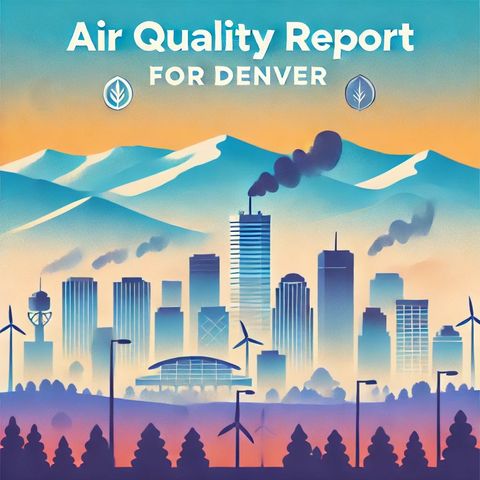Denver's Air Quality Struggles: Inversions, Wildfires, and Ozone Challenges

Download and listen anywhere
Download your favorite episodes and enjoy them, wherever you are! Sign up or log in now to access offline listening.
Description
I can't search the internet in real-time, but I can provide some general information about air quality in Denver and how it is typically influenced by various factors. Denver's air...
show moreThroughout the year, Denver experiences variable air quality. In the winter, the city faces challenges from inversions, while the summer months can bring high levels of ozone, often exacerbated by wildfires in the region. Ozone is more prevalent in the summer due to the increased sunlight and hotter temperatures, which promote chemical reactions in the atmosphere. Particulate matter, stemming from both local sources and regional wildfires, is also a significant concern throughout the year.
Efforts to improve air quality in Denver include regulatory measures to reduce emissions from industrial sources and vehicles, public transit initiatives, and public awareness campaigns encouraging activities that lower individual carbon footprints. Monitoring stations throughout the city provide real-time data and forecasts, helping residents stay informed and make decisions to minimize exposure during periods of poor air quality.
In recent years, wildfires have become an increasing concern, impacting air quality not only in Denver but across Colorado and the wider region. Smoke from these fires can travel vast distances, creating hazardous air conditions. On days when air quality is predicted to be poor, particularly those impacted by fires or high ozone levels, residents are advised to reduce outdoor activities, especially those with respiratory conditions.
As of late, Denver has been working to address air quality issues with initiatives aimed at reducing emissions and increasing greenery in urban spaces, which can help absorb pollutants. The city's efforts also include expanding bicycle and pedestrian infrastructure to promote less reliance on vehicles.
For the most up-to-date information on Denver's air quality, the Air Quality Index or local environmental agencies and news outlets usually provide detailed forecasts and current conditions. These resources help the public understand and react to air quality changes, ensuring that residents can protect their health while enjoying Denver's many attractions.
Information
| Author | QP-5 |
| Organization | William Corbin |
| Website | - |
| Tags |
Copyright 2024 - Spreaker Inc. an iHeartMedia Company
